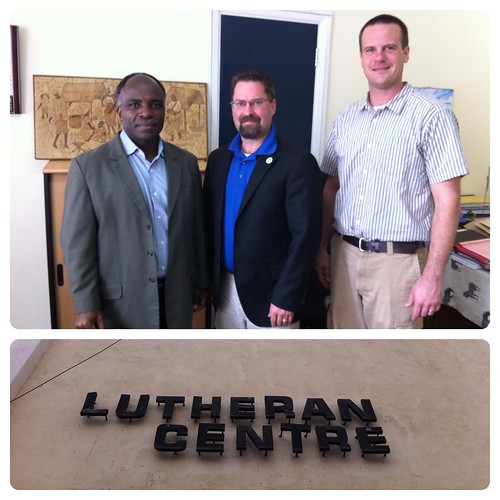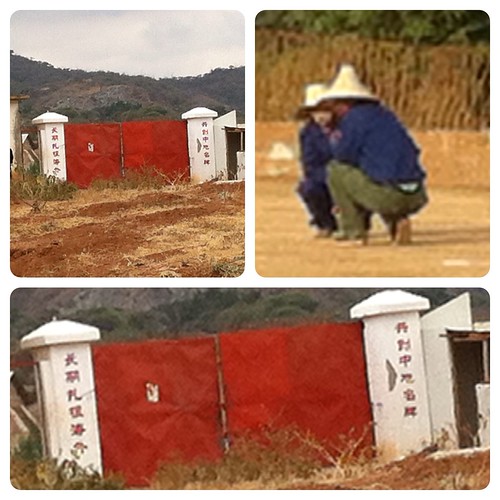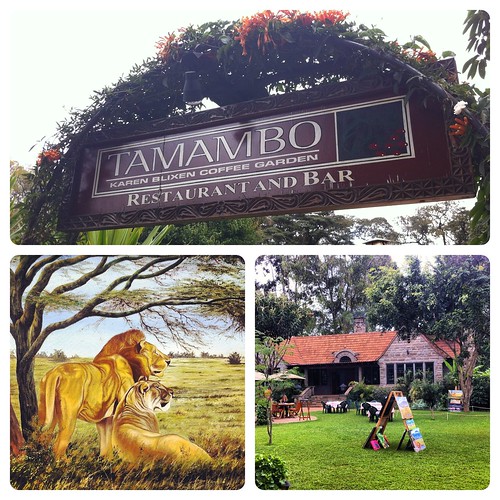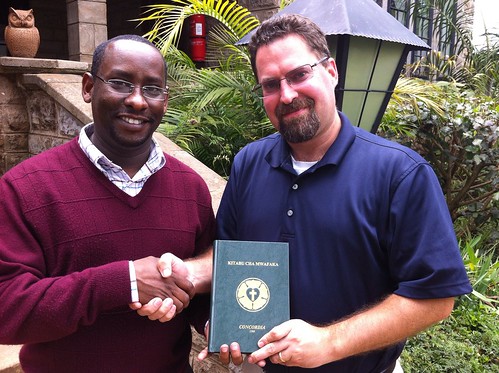1856 Ordination Rite Translation
Translator’s Note:
The text below is a translation of the German Church-Agenda for the Evangelical Lutheran Church Synod of Missouri, Ohio, and other states.
Kirchen-Agende für Evangelisch-Lutherische Gemeinden. (St. Louis: Druckerei der Deutschen Ev. Luth. Synod, 1856).
The ordination rite is taken from pages 171 – 176 of the aforementioned book. The numbers appearing in brackets [ ] correspond to the original page numbering of the Kirchen-Agende.
The aforementioned Kirchen-Agende was translated into English in 1881; however, the translation omitted several parts including the ordination rite translated in this document.
Church Liturgy for Evangelical Lutheran Congregations. (St. Louis: Concordia Publishing House, 1881).
Albert B. Collver, III
1998 Epiphany 5
Ordination
The ordainer steps with his assistant to the altar. On the steps of the altar stands the one to be ordained. At the conclusion of the song, the ordainer and his assistant turn around facing toward the one to be ordained and the first one says:
Our Lord Jesus Christ said after his resurrection to his disciples (John 20): “Peace be with you! Just as the Father sent me, also I am sending you. And when he said this, he breathed on them and said to them, “Receive now the Holy Spirit! Whomever’s sin you remit, it will be remitted to him and whosoever you retain, to that one it will be retained.”
And later before his Ascension he said to them (Matt 28): “All authority in heaven and on earth has been given to me. Therefore, go there and teach all peoples and baptize them in the Name of the Father and of the Son and of the Holy Spirit, and teach them to hold all, which I have commanded you. And behold, I am with you all the days until the end of the world.”
And after he ascended above all heavens, so that he fulfilled all things, he appointed some as apostles, some as prophets, some as evangelists, some as shepherds and teachers, that the saints would be prepared, for the work of the Office, so the body of Christ will be built up. (Eph. 4:11ff.)
Therefore the office, which preaches reconciliation, is setup by the Lord himself. The office is of the Spirit, who judges the living and the dead. The office of the New Testament is not held by one who is fit of himself, but he who is fit is [fit] because of God. They are ambassadors in the stead of Christ, God admonishes through them, and they bear God’s office full of exuberant clarity. (2. Cor. 3:5)
Therefore you ought also to adorn it in all respects, as St. Paul wrote to Timothy and Titus. For a bishop should be blameless, a man of one wife, who has believing, obedient children with all respectability, who administers his own house well (but if someone does not know how to administer his own house, how will he provide for the congregation of God?). [172] [A bishop ought be] not stubborn, not angry, sober, moderate, not a wine swiller, not a braggart, not dishonest working with his hands, virtuous, pure, chaste, just, holy, hospitable, kind, not a brawler, not avarice, gentle, not a novice, so that he does not puff himself up and fall into the judgment of the Blasphemer, apt to teach, because he holds on to the Word, which is certain and able to teach, so that he be able to exhort through the salutary teaching and to reprove the gainsayer. He must also have a good reputation from those who are outside, so that he does not fall into disgrace and the Blasphemer’s trap. He should persist with the reading, with exhortation, with teaching and not disregard the gift, which was given to him through the prophecy with the laying on of the elder’s hands. He should wait, [and] contemplate, so that he will increase in all things manifest. He should have concern for himself and the teaching and remain steadfast in his task. For in whatever he does, he will bless himself and his hearers. – Most of all in the same way the holy Apostle in his exhortation to the elders called to Ephesus (Acts of the Apostles 20.) recently united, thus he said, “Thus, now take care of yourself and of the flock, which the Holy Spirit has appointed you under as bishop, to tend the congregation of God, which he purchased through his blood.”
All this makes plain for you, what a high and holy office this is, into which you were called, and that what the Apostle said is certainly true, “Whoever desires the office of bishop desires a wonderful work.”
Here the one to be ordained kneels down.
Therefore, I ask you now, beloved brother in the Lord Jesus Christ, before the eyes of God, our Lord Jesus Christ and his holy angels, also in the hearing of this congregation, whether you, after careful consideration are ready to take upon you this holy office, and according to the ability that God gives [unto you], to execute and administer [it] according to every pleasure of the Lord and Arch-Shepherd of this congregation?
Answer:
Yes, I am willing after earnest consideration for the holy office, which God has called me to be placed upon me; I solemnly vow and pledge before God and his congregation [173] according to the ability that God gives to execute and administer it according to every pleasure of the Lord, the Arch-Shepherd and Bishop of Souls.
The ordaining pastor continues:
But do you also confess that you are obliged to carry out in accordance with his office, in the three chief Creeds of the church, the Apostles, Nicene, and Athanasian, as in the unaltered Augsburg Confession, the Apology, the Smalcald Articles, both catechisms of Luther and the Formula of Concord are found a pure and correct explanation and exposition of God’s Word and Will? And are you willing to execute on account of this your office according to these confessional writings of our holy church and to do this to your death?
Answer:
Yes, I confess the three chief Creeds, the unaltered Augsburg Confession, the Apology, the Smalcald Articles, both catechisms of Luther and the Formula of Concord as the pure, correct explanation and exposition of the divine Word and Will; I confess the same as my own confession and intend to perform my office until my death truly and diligently in the same way. May God strengthen me through his Holy Spirit! Amen.
The ordaining minister speaks again:
Upon this your promise before God and us, we ask God, the Father of our beloved Lord Jesus Christ, the one Lord of the harvest, that he, who called you to his Office, make you able through his Holy Spirit. May he grant, that you give no one offense, lest in this way the office is slandered, but demonstrate yourself in all things as a servant of God, in great patience, in afflictions, in needs, in anxieties, in beatings, in imprisonments, in tumults, in work, in watching, in fasting, in chastity, in knowledge, in long-suffering, in friendliness, in the Holy Spirit, in pure love, in the Word of Truth, in the power of God, through the weapons of righteousness in the right hand and in the left hand, through honor and dishonor, through malicious rumors and good rumors, as a seducer and yet truthful, regarded as unknown and yet known, as dying and behold, you live, as beaten, and not yet killed, as [174] a mourner, but at all times cheerful, as poor, but making many rich, as having nothing, but yet having all things. (2 Cor. 6.) The Lord gave you, therefore, to endure and to do the work of an evangelistic preacher, that you may be able to appear on that great day before the judgment seat of our Lord Jesus Christ, to give a common answer, to the strict and just judge of the living and the dead, to receive praise and honor out of his hand and to shine as the heavenly splendor and as the stars forever and ever!
Next the assisting ministers lay hands on [him] and each speak a biblical wish.
Then the ordainer speaks again.
We consign you now through the imposition of our hands to the holy office of the Word and Sacraments of God, the Trinity, ordain and consecrate you to the service of the holy church in the Name of the Father, of the Son, and of the Holy Spirit!
The other fellow ordaining ministers answer:
Amen. Amen.
Then all the ministers pray together:
Our Father … forever and ever! Amen.
The ordainer again:
Let us pray! Merciful God, heavenly Father, you have spoken to us through the mouth of your dear Son, our Lord, Jesus Christ. “The harvest is great, but the workers are few – pray to the Lord of the harvest, that he send workers into the harvest.” By this your divine command we pray from the heart, that you would give abundantly this your servant together with us and everyone, whom you called to your office, your Holy Spirit, that we may spread your Gospel, continue truly and strongly against the Devil, World, and Flesh, in order that your Name be hallowed, your kingdom increase, your will be done. Put a stop also to all your enemies, who oppress your Name, destroy your kingdom, oppose your will, place a limit and end, and wherever your servants bear witness and work, distinguish your witness and the work of your hands to the glory of your most holy Name and to the Holy Spirit. Amen.
[175]
The ordainer says to the ordained:
Thus lead and tend the flock of Christ, that you have been entrusted with, and watch [it] well, not under compulsion but willingly, not for the sake of vile gain, but from the bottom of your heart, not as one who rules over people, but become an example for the flock; that you may receive the unfading crown as an inheritance when the Arch-Shepherd appears. The Lord bless you from above and make you a blessing for many, that you may produce much fruit and your fruit remain for eternal life!
The ordained answers:
Amen.
Afterwards one sings: “Lord God, We Praise You …” or “Now Thank We All …”, whereupon the Holy Meal begins with the Words of Institution. The ministers accompany the newly ordained to the Table of the Lord.
__________
If an already ordained minister enters a new parish, allow the installation of him to proceed in the same manner, only that the conferring [of the office] not happen in general, but after answering the questions one of the following prayers beneath the laying on of hands is spoken, and after that: “Go Now To That Place …”
__________
Two Prayers
For use after the answering of the installation questions.
1.
Merciful God, heavenly Father, you who have fatherly comforted and promised us through your holy apostle Paul, that it is your good pleasure, O heavenly Lord and Father, to save all who believe through the foolish preaching of the crucified Christ. We pray from the bottom of our hearts, that you would bestow with Divine grace and grant and impart to this your servant, whom you have called to your Holy Preaching Office, your Holy Spirit. In the same way grant and impart strength to him against all trials of the Devil and make him wise and able to lead, your costly bought sheep with your salutary and true Word according to your divine will to the praise and glory of your Holy Name, through Jesus Christ! Amen.
[176]
2.
O Lord Jesus Christ, you the eternal Son of God who sits on high at the right hand of your heavenly Father, give gifts to the men on earth and send them shepherds and teachers, that Holy men be prepared for the work of the office and the building of your spiritual Body: we say from the heart to you praise, honor, thanks, that you have given your congregation once more a shepherd, and we pray that you would bestow your Divine grace to him and to us, that we may do what is due to you, to maintain faith and good conscience until death and obtain eternal life with all the elect. Amen.
The assisting minister receives a kind of ordination, as pastor, each case with respect to the congregation, whom he should serve chiefly, and where possible in their midst.
On the day of ordination or installation, the new pastor does not preach, but his entrance speech follows on the immediate following Sunday.
__________
The Lord bless you and keep you!
The Lord illuminate his face upon you and be gracious to you!
The Lord lift up his continence upon you and give you peace. Amen.
Originally posted on Logia's Blogia (
click here for original link).
__________
Original German Below.











































